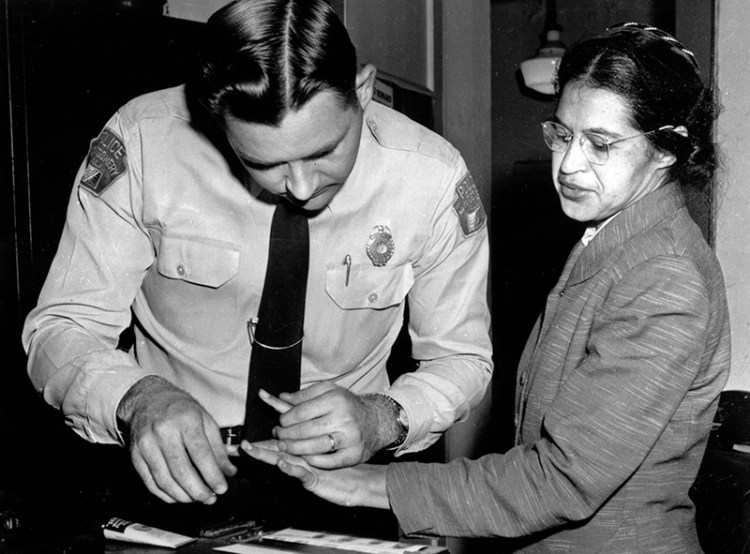MONTGOMERY, Ala. – Leroy Pierce calls the Dec. 1, 1955, arrest of Rosa Parks “an arrest that affected more people than any arrest ever made.”
“It went worldwide,” Pierce said.
Pierce would know. Then a 28-year-old patrol officer with Montgomery Police Department, he was the first officer to arrive on scene when bus driver James Blake called police on a black woman who refused to change seats when asked, and he’s one of two known surviving witnesses to Parks’ arrest.
The detainment of Parks was the spark that ignited a 13-month struggle against the inequity of Montgomery’s segregated bus system, and Wednesday marked the 63rd anniversary of the Montgomery bus boycott, a pivotal moment of protest and prolonged sacrifice that swung the needle of change in favor of the civil rights movement.
“To me it was a regular, routine arrest, therefore I didn’t think anything else about it until the next morning after I went to work,” said Pierce, now 91, in an interview with the Montgomery Advertiser this week. “We didn’t know anything big was going to happen.”
Pierce was riding his motorcycle for the city of Montgomery when a call came out on the radio that a bus driver was “having problems with one of the passengers.”
“I was only about three or four blocks from it and the patrol car was about a mile or more. So not knowing what it was, if you’re a good police officer and something is happening on the bus, you know somebody needs to look at it, because anything could be happening,” Pierce said.
He arrived to find Blake standing near the door of the bus saying he was “having problems with a black female sitting in the white section of the bus.”
The line segregating buses would often change depending on ridership. The other surviving witness to Parks’ arrest, Mineola Dozier Smith, was a passenger on the bus who has said Parks was sitting in the black section.
Blake later testified he asked several blacks to move to “equalize the seating,” according to archived newspaper reports.
Knowing the patrol car wouldn’t arrive immediately, Pierce stepped on the bus “to make sure everything was all right.”
“When I got on that bus, she was the only one sitting up front and there were three or four other blacks sitting in the back end of the bus, sitting there not saying anything. I didn’t say anything to Mrs. Parks. In fact, I didn’t know her name until after the arrest was made. I just looked and saw where the dividing line was where whites were up front and blacks were behind, to make sure she was in violation of the city ordinance,” Pierce said.
After officers F.B. Day and D.W. Mixon arrived, Pierce watched as they arrested her, and he followed Parks off the bus.
“They offered her a chance to move to the back and she refused. So one of them touched her on the shoulder and said, ‘You’re now under arrest in violation of city ordinance for not sitting in the proper place.’ But she didn’t move. So one of them reached down and helped her get up,” Pierce said. “There was talk by reporters and other people that she was handcuffed and drug off the bus. That is a total lie. There were no handcuffs and she was not drug off the bus, because I walked off right behind her.”
That’s another point of contention, as Dozier Smith recalled Parks getting handcuffed “like she had stolen something.”
Pierce also emphasized that Parks “acted like a lady during that time, and she didn’t give us no problems.”
“I didn’t have any prejudice against her. I still don’t,” Pierce said.
The last time Pierce saw Parks in person was as the seamstress’ head was guided into the backseat of the patrol car.
But in the following days, Pierce watched as she became the face of a movement.
“Didn’t think anything else about it. Till the next day,” Pierce said.
Flyers papered the black section of city buses that weekend, each one imploring black citizens to find other means of transportation on Dec. 5, 1955.
Newspaper reports describe black citizens physically stopping others from getting on the bus that Monday. A poster tacked to the wall of the bus shed read, “Remember, it is for our cause that you do not ride the bus today.”
The planned one-day boycott of Montgomery City Lines became a 381-day protest of the segregated bus system that ended with a U.S. Supreme Court ruling that segregated public buses were unconstitutional.
The success of the boycott elevated Montgomery Improvement Association President Martin Luther King Jr. into prominence and demonstrated the power of nonviolent protest in the face of oppression.
After seeing the change brought by Parks’ arrest, Pierce said he’s glad the arrest happened.
“I’m glad it happened, because there were times when I saw people mistreated and I didn’t like that. I thank the Lord I didn’t mistreat anyone. If I did, I’m sorry,” Pierce said.
Send questions/comments to the editors.



Comments are no longer available on this story